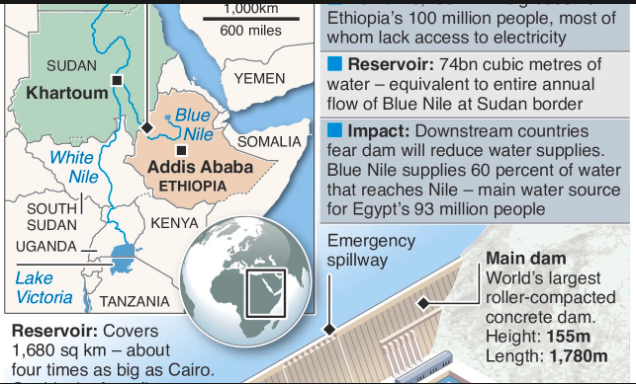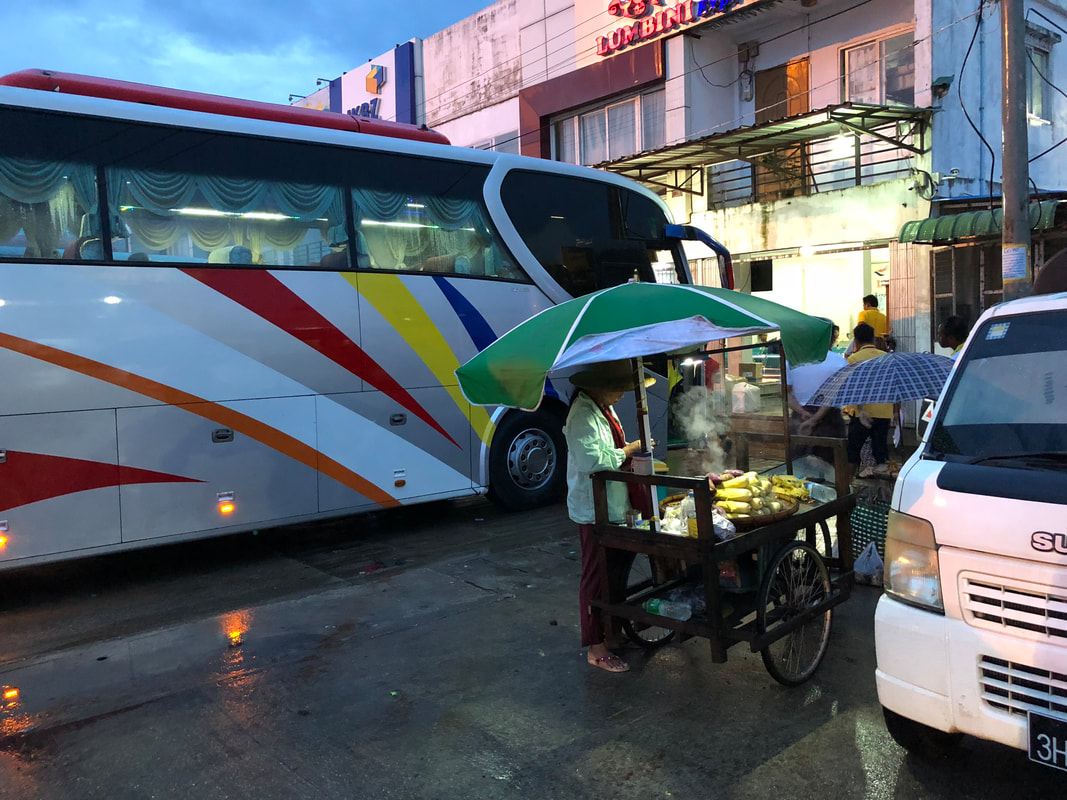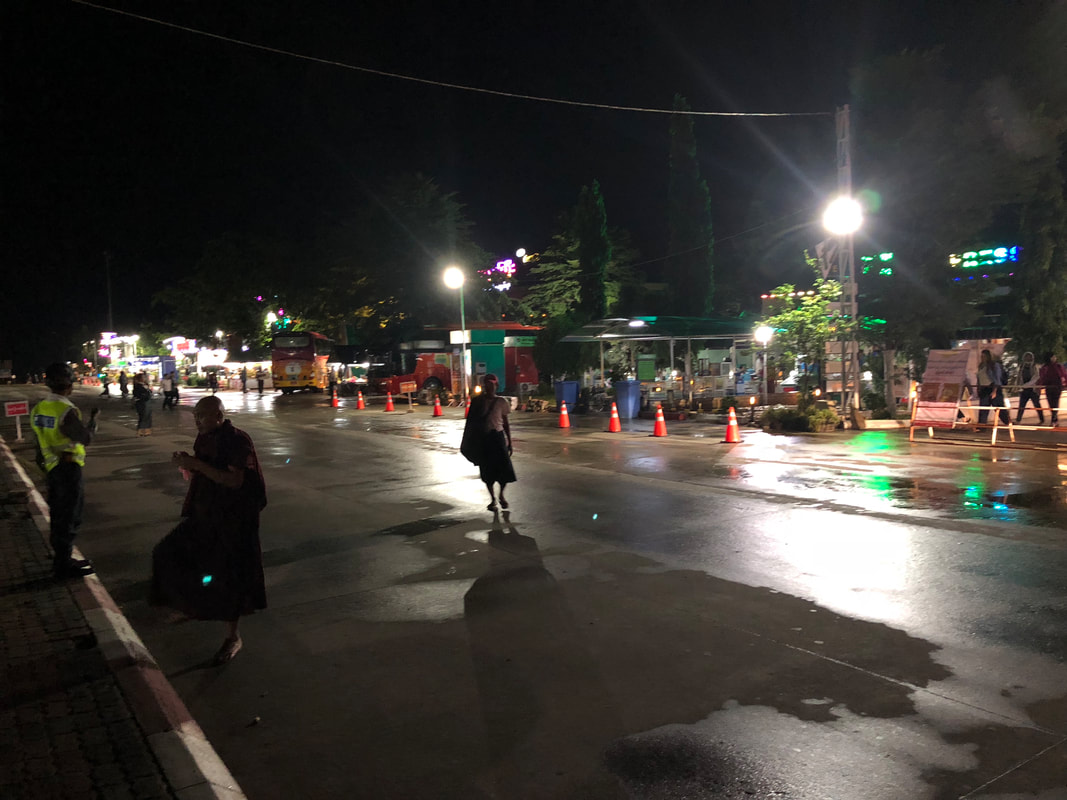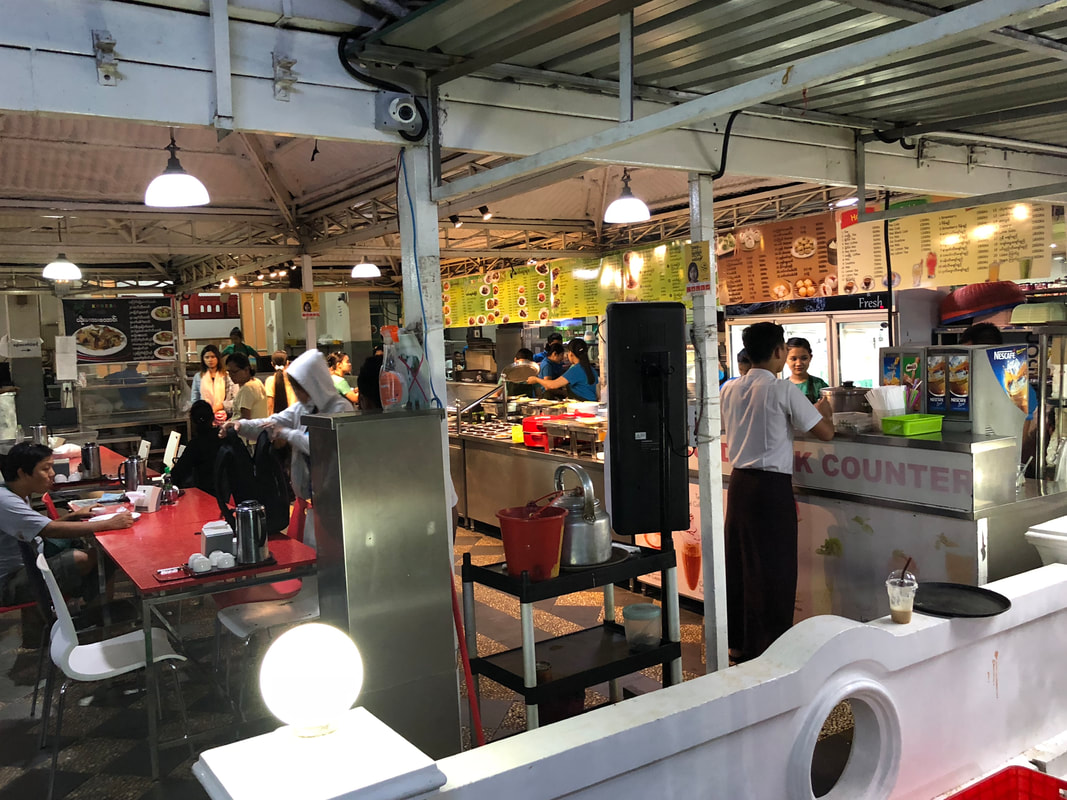|
You feel more like a member of a community if you get out into it. My colleagues and I started going for early morning walks shortly after moving to Bahir Dar. People in the neighborhoods were welcoming. We felt more comfortable in our new home. Mulageta, who worked at the Fila, our first hotel residence, saw we were walking every morning and invited us to his aerobics club. He said walking is good, but not enough. It's true for me. Aerobics start time is 5:45 a.m. GT. That's early even for us. It's still dark. The club had lots of benefits. Good exercise and meeting people from other walks of life than the University (e.g. the director of the local (Jimmy) Carter Center office). Even if we cannot speak Amharic, we felt welcomed and part of a group. Now I have added biking to my yoga/walking/aerobics routine. I sleep better. But my Amharic. I still can't count to 10. Sometimes the aerobics club has activities outside the Tuesday/Thursday/Saturday exercise. The feast above was to celebrate the club's 10th anniversary. We met at the high school where we do our exercise. A few women cooked up a delicious dinner of tibs. Beer is a sports drink? Below is the city wide aerobics event that happens once a month downtown. It was a blast.
0 Comments
New Year's Eve celebration at the Blue Nile Resort, Bahir Dar, Ethiopia. Good food, good company and a bonfire. The few tourists we saw at the bonfire out drank and out danced the expats. But then, they didn't have to go to work the next day. Meron, who owns Chez Meron, had asked Gaja to teach her how to make Indian Curry chicken. Jill seized the opportunity by suggesting they do it on Boxing Day, her birthday, and threw the party for us. So when Americans are taking back their unwanted or ill fitting gifts to scoop up all the after Christmas sale merchandise, we were at Chez Meron's enjoying a rare opportunity to have a delicious Indian dinner. Chicken isn't neatly packaged in plastic in the refrigerator section of your supermarket in many developing countries. Chicken on a stick in Ethiopia is bought as fresh as can be. The consumer does the rest. In Ethiopia you are never far removed from the source of production. We took Sami and Kathleen to the big market in Bahir Dar. Then to our favorite fish restaurant right on Lake Tana where local fisherman come in to have their catch cleaned and sold. That's why you see all the pelicans hanging out by our lunch table. Kathleen's Kuriftu resort serves as a final, and greatest contrast between the real world and the one we often find ourselves isolated in. We stopped on an island on our way back to Bahir Dar from the Zege peninsula. As we inspected this building, a monk passing by informed us that it used to be a prison. There was probably no need for bars or fences. The nearest land would be too far for most people to swim to. The weather would make doing time here not as bad as Alcatraz, where it can be beautiful but also bone chilling cold. You also would not have to listen to the rich people partying at the nearby yacht club of an evening and be reminded of what you might be missing.
A peaceful boat ride and walk through a forest of coffee trees and vendors selling crafts brings you to this 14th Century Church. It is said by some to be the most beautiful in the Lake Tana region, and for good reason. The contrasting colors set against the mud/straw walls feel symbolic of Ethiopia. See https://en.wikipedia.org/wiki/Ura_Kidane_Mehret for more information. Below are photos from the museum next to Ura Kidane Mehret Church. One book dates back to 900 A.D. Our guide asked us if we wanted to go into it. When we said yes he summoned a monk who let us in. It was much more impressive than this afterthought would imply. The catch is that the peaceful walk through the forest winds through a variety of shops selling local goods. There were some nice local crafts, from locally harvested incense to pictures on leather to jewelry fashioned out of old, obsolete coins. Frankincense is readily available in Ethiopia, unlike the U.S. It smells wonderful and is used in Ethiopian religious ceremonies, homes and coffee ceremonies on the street or in a restaurant. See https://fairtradefrankincense.com/tag/ethiopia/ It was easy for me to resist everything by the coffee. Jill could not resist buying a local craft from this girl, who drove a hard bargain to the amusement of even the locals who joined us while we had our coffee. The coffee here was delicious as most Ethiopian coffee is. These people are roasting the beans grown there on the peninsula, brewing the coffee while burning frankincense they harvested. They were not going to charge us for the coffee. They wanted to sell us some frankincense instead. I paid for the coffee. Lake Tana is the source for the Blue Nile, the main tributary of the historic Nile River, the longest river in Africa. The falls are one of the main sites to see near Bahir Dar. We arrived at the end of the rainy season, so they were at their best. You drive through farms and villages on what I would call a rough road. There is a lot to see and enjoy on the way. Best of all, it's a good hike up to the falls on a trail the locals use for commerce, and to try to sell you everything from trinkets to help with pictures. Kids beg for pens "for school." Adults ask for money for school or just in general. A musician plays a traditional instrument at the end of the trail. That I paid for. I don't enjoy the touts, but nobody does. We were warned they will walk along and try to help you over parts of the trail, then demand payment in the end. I did let a guy take a few pictures. He was unhappy about his tip at the end. This is the part of traveling I don't enjoy. I know people need the money, but I prefer to give in more systematic ways to try to make more of an impact. My colleagues Hilarie, Jill and Merouane were joined by Johannes, a student in Merouane's Department, and an official guide. It may have been a bit of a challenge for some, but worth it for all. The churning river foreshadows the political/legal controversy downstream. Water rights are always a potential for conflict. Even more so in a future with climate change creating more uncertainty in weather and the possibility of crop failures, not to mention sufficient drinking water for a growing population. Although this controversy has been covered well globally in sources like Al Jazeera, and of course locally, I doubt much of the Western World is in tune to it.
The Blue Nile provides over half of the water in the Nile, Egypt's water supply, as well as a source for Sudan. So Ethiopia's nearly finished hydroelectric dam on the Sudan border has caused a source of dispute between the countries. The dam can make Ethiopia an energy exporter in the next couple of years. But Egypt is concerned it will pay for this with insufficient water for its needs. For more information FanaBC's story from October 8, 2019: Ethiopia Says Egypt’s New Proposal On GERD Crossed Red Line The map above helps provide some helpful context. You can find it here. I am finding there are other conflicts on the Blue Nile here, including industry pollution. Hopefully there will be a project created around this. As we shoved off from the Bahir Dar dock I wondered if our boat had inspired the Disneyland creators of the Jungle Boat Cruise. It looked alike enough and old enough. But our first, and most pleasant surprise, did not come from Disney's script. It was a flock of Pelicans. A man in a traditional boat kept their interest long enough for the occasional tourist to come by and pay him for the opportunity to feed them. The opportunity to see these curious birds eat up close and feed them was worth the extra 100 Birr (about $3.33) for this unusual tourist trap.
Later we visited the headwaters of the Blue Nile (pictured and tagged). There we saw hippos (not pictured). The only hippo I saw on land was bloated after being shot a few days earlier because it posed a "threat" to the people. It was our first day off since arriving in Ethiopia over a week ago. We had little downtime or chance for quiet, if there is such a thing, in an Ethiopia city as quiet. On our first visit to Inle Lake it was not obvious to use that it is an ecosystem in trouble. It is one of the most beautiful places I have been. You feel like you have stepped back in time, but for the plastic containers and diesel boat engines. Agriculture and tourism are putting a strain on the ecosystem. Pesticides may make the water and fish unfit for consumption, but many of the people, like us on that first visit, may not be aware of the problems below the surface. I love to experience a culture through travel and food. Taking a 12 hour night bus for locals, not tourists, is a good introduction to another culture. If you can't make it to Myanmar to do this, check out Anthony Bourdain’s Parts Unknown: Season 1: Episode 1 Myanmar, Apr. 14, 2013 on Cable News Network (CNN). It will give you an interesting look at Myanmar shortly after the military started to open up the country to outside visitors. https://www.cnn.com/videos/bestoftv/2013/04/15/ab-anthony-bourdain-episode-1-entire.cnn (last visited Jan. 19, 2019).
|
Archives
March 2023
|




 RSS Feed
RSS Feed